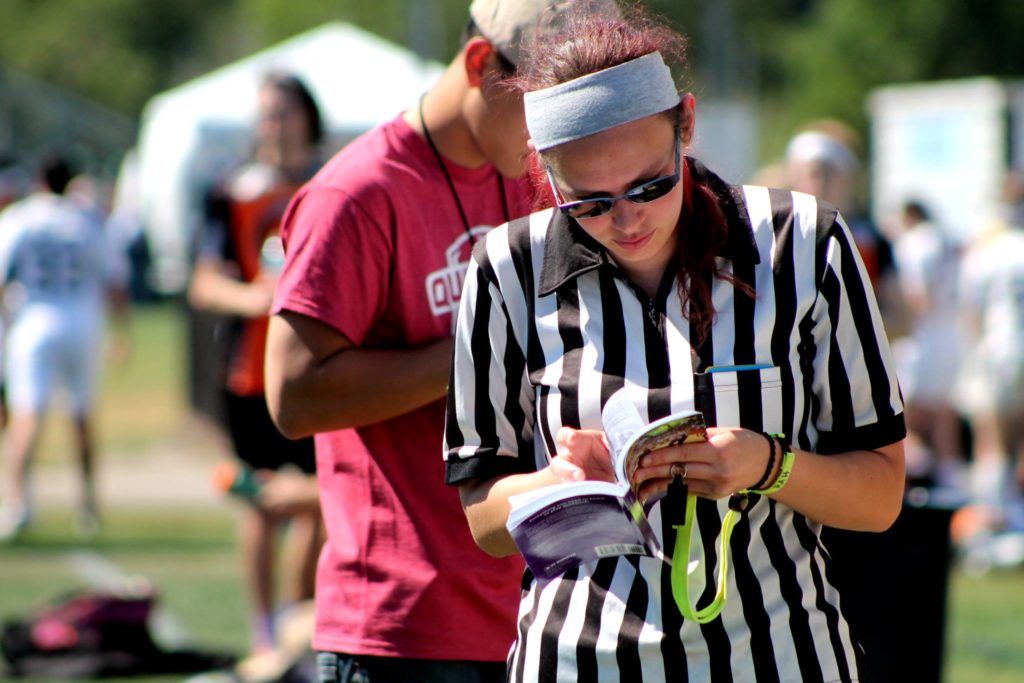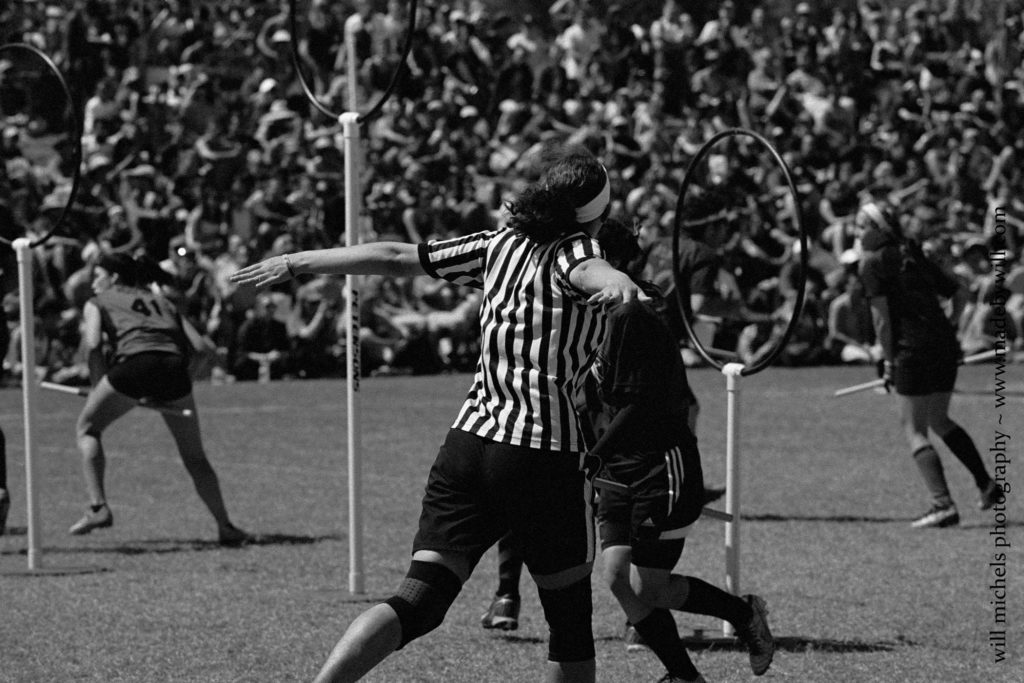Antwerp QC, Much of Belgian Core, Leaves Competitive Quidditch

Credit: Chris Rothery
Editor’s Note: This is the second piece in our series highlighting women in quidditch. Don’t forget to read our first article on University of Texas’s Hallie Pace. The profiled party in the below article, Ra Hopkins, uses they/them/their pronouns and is greygender/genderfluid.
As the Los Angeles Guardians and San Francisco Argonauts were preparing to square off for the 2017 MLQ West Division title, Ra Hopkins was en route to referee the series. However, their transit was delayed when they were involved in a car crash involving multiple vehicles. Shaken up, but realizing that the series likely wouldn’t happen without them present, Hopkins did the least surprising thing for anyone who knows them: they showed up and refereed.
If you’ve played at a US Quidditch Cup or one of its former iterations, there’s a good chance you’ve had Hopkins as a referee. They are one of the very few prominent non-male referees and has been excelling in the role for years, beginning as an assistant referee during the World Cup V season and moving into the role of head referee the next year. Additionally, they have served as the referee coordinator for the Northern California Quidditch Conference since its inception in 2015 and served as the MLQ West Division Referee Coordinator the past two years. Hopkins is just one of the three non-male recipients of USQ’s Referee of the Month (out of a total of 19 awards), having earned the honors in February of 2016. This resume doesn’t come in the form of a giant, though. Hopkins comes in the form of 69 inches of a stick of a human being.
Hopkins’ small stature belies the shadow they have cast over refereeing in this sport. Couple that size with all the stigmas that come with being a non-male referee in quidditch—and sports in general—and it becomes all the more impressive.
“Ra is an excellent head referee. A big part of that has nothing to do with a grasp of the rules,” said Elizabeth Barcelos, NCQC commissioner. “Rather, Hopkins is infinitely better at—pardon my language—not giving a damn than I am. I could not put up with what they do, which is why I stopped being a head referee.”
Barcelos went on to address an issue many of us are aware of, as it not only affects refereeing in quidditch, but day-to-day life.
“A male head referee with a command of the pitch is authoritative and respected. No one questions Martin Pyne, for example. Nor should they; he is excellent. But Ra, who is just as good (if not better) and has been a head referee for longer, has been called bossy and other words that start with a B,” she said. “That’s not a quidditch problem; it’s a sports culture problem. But we need to be better.”
For a sport that celebrates its inclusiveness, many aspects of quidditch share many of the same problematic issues around gender and sex that are seen in other sports. People who don’t present as males are oftentimes looked down upon in almost every role, from Carolina Panthers quarterback Cam Newton finding it funny to hear a female reporter ask about routes to Adidas removing a female referee after Lavar Ball threatened to have his team forfeit if she were an official in the Adidas Summer Championships. Male-presenting individuals vastly outnumber non-males in coaching, analysis, refereeing and in almost every tactical position in the not just quidditch, but sports in general. It is not unusual that a non-male coach or analyst’s understanding of quidditch is questioned in manners males do not face. Clay Dockery, who has a long career of managing referees for both MLQ and USQ, has witnessed this issue many times first-hand with non-male referees.
“In the most basic sense, the way I see it as an outside observer is that people have an irrational double standard for non-male refs,” he said. “Any issues are attributed to their gender identity and personality traits are exacerbated by expectations. When Ra and others are being strong, teams say it is ‘too strong’ or ‘too strict,’ but if they let little things go they are called ‘too lenient.’ I know it is a standard that is never applied to male-presenting refs like me.”

Credit: Quidditch by Will
Being perceived as a woman themselves, Hopkins is more sensitive to providing feedback to other non-male referees in a way that bolsters their confidence and encourages them to continue to learn and grow. Elsa Lem and Kim Cheng of SJSU are two examples of non-male referees that Hopkins has taken the extra step to train. Barcelos also attributes Hopkins to her growth as an official.
“Ra’s biggest impact locally is they are the only referee I know that has been actively recruiting, nurturing and training up new head referees,” Barcelos said. “They were instrumental in my becoming a head ref and now they’ve done it again with Kim Cheng.”
Northern California is a place in the league with most referees concentrated on a small number of teams, relying heavily on community teams the Silicon Valley Skrewts and Vipers to provide these volunteers. Hopkins, according to Barcelos, has made a concerted effort to improve not just the numbers but also the quality. They have run referee clinics and Skype study sessions in the area in order to help young unofficial teams, such as University of Pacific, grow their programs.
But this is done in other regions, as well. According to Barcelos, what truly sets Hopkins apart is they do more than just teach.
“You can study the rulebook and pass all the tests on paper, but having someone model how to referee and reach out to encourage you is so rare. Hopkins is always ready with constructive criticism and the help you need,” she said.
Dockery also sees the value Hopkins has had in refereeing in the West.
“Without Ra’s service as MLQ West Division Referee Coordinator we would have been unable to staff the West Division,” he said. “Ra heading all over the Division or pushing other refs to help out was the only way we made it work over the past two years.”
Reffing in quidditch is, according to many, a thankless job, and Hopkins has reffed at every level there is: USQ Cup finals, IQA World Cups, regional championships and local conference tournaments. Very few people have been able to endure in it for the long term, and even fewer non-males have lasted. Yet, through all of this, Hopkins has stood tall.
“Ra has never given up reffing, never stopped improving, never given up trying to help new refs. Being a head referee is such a grind that that kind of persistence is incredible,” Barcelos said. “I’ve seen other great femme referees throw in the towel after dealing with toxic masculinity and everything comes with it, but not Ra. I admire them so much for that.”
Archives by Month:
- May 2023
- April 2023
- April 2022
- January 2021
- October 2020
- September 2020
- July 2020
- May 2020
- April 2020
- March 2020
- February 2020
- January 2020
- December 2019
- November 2019
- October 2019
- August 2019
- April 2019
- March 2019
- February 2019
- January 2019
- November 2018
- October 2018
- September 2018
- August 2018
- July 2018
- June 2018
- April 2018
- March 2018
- February 2018
- January 2018
- November 2017
- October 2017
- July 2017
- June 2017
- May 2017
- April 2017
- March 2017
- February 2017
- January 2017
- December 2016
- November 2016
- October 2016
- September 2016
- August 2016
- July 2016
- June 2016
- May 2016
- April 2016
- March 2016
- February 2016
- January 2016
- December 2015
- November 2015
- October 2015
- September 2015
- August 2015
- July 2015
- June 2015
- May 2015
- April 2015
- March 2015
- February 2015
- January 2015
- December 2014
- November 2014
- October 2014
- September 2014
- August 2014
- July 2014
- May 2014
- April 2014
- March 2014
- February 2014
- January 2014
- November 2013
- October 2013
- September 2013
- August 2013
- July 2013
- June 2013
- May 2013
- April 2013
- March 2013
- February 2013
- January 2013
- December 2012
- November 2012
- October 2012
Archives by Subject:
- Categories
- Awards
- College/Community Split
- Column
- Community Teams
- Countdown to Columbia
- DIY
- Drills
- Elo Rankings
- Fantasy Fantasy Tournaments
- Game & Tournament Reports
- General
- History Of
- International
- IQA World Cup
- Major League Quidditch
- March Madness
- Matches of the Decade
- Monday Water Cooler
- News
- Positional Strategy
- Press Release
- Profiles
- Quidditch Australia
- Rankings Wrap-Up
- Referees
- Rock Hill Roll Call
- Rules and Policy
- Statistic
- Strategy
- Team Management
- Team USA
- The Pitch
- The Quidditch Lens
- Top 10 College
- Top 10 Community
- Top 20
- Uncategorized
- US Quarantine Cup
- US Quidditch Cup
